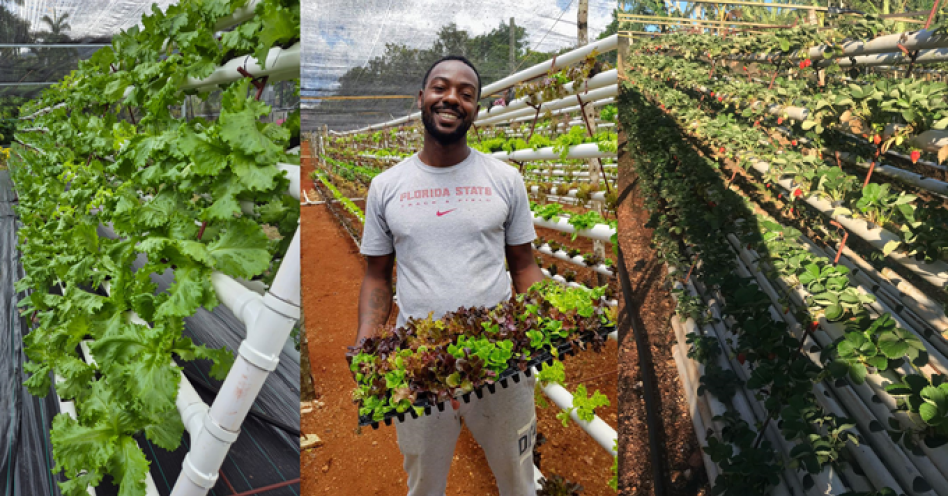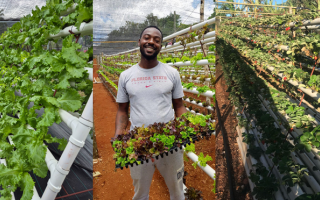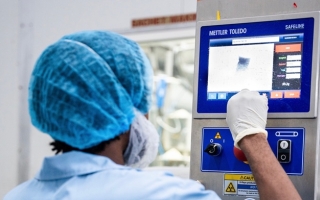Olympian and Sean Paul cultivate change
Article By: Old Harbour News

Olympian turn agriculturalist Ricardo Chambers on his farm.
“I’ve always had an interest in farming and growing my own food; it is something to do in my pastime,” Sean Paul shares. “When I heard about Chambers Hydro Farm and the work Ricardo is doing, I didn’t need convincing. This is what sustainable development should look like – innovative, community-based and grounded in straightforward solutions.”
Sean Paul’s passion for agriculture isn’t new. Through the Sean Paul Foundation, he has long championed food security and community empowerment. In 2020, the Foundation partnered with Food For The Poor Jamaica to provide rainwater harvesting systems to small farmers across the island. Supporting initiatives likes Chambers Hydro Farm is a natural progression of this work, focused on empowering everyday Jamaicans to grow smarter and live more sustainably.
“I think as an island and with everything happening in the world, families, not only those in farming communities, should consider growing their own food,” Sean Paul expressed.
Launched in 2018, Chambers Hydro Farm started with leafy greens and a bold idea: that Jamaican agriculture could leap into the future using hydroponic technology. After startup, the business faced severe setbacks as its distributors and hotels shuttered their doors during the COVID-19 pandemic. Instead of giving up, the ambitious founder and CEO didn’t fold, he pivoted. “We started distributing knowledge. If people weren’t buying produce, at least they could still learn how to grow it themselves,” Chambers shares. Through community outreach, youth programmes like Swaby’s Hope Youth Club and hands-on system demos, Chambers spread the knowledge gained from years of research.
“We are a development and research entity with a mission to revolutionise agriculture by introducing innovative and forward-thinking methods. Research is never complete; this is a continued effort in trying to provide new knowledge to farming communities and the wider sector,” Chambers emphasised.
He added, “I discovered hydroponics while in university and that’s when I started delving deeper into research on farming technology and reading more about methods used in regions that have similar climates to Jamaica and the Caribbean. After encouraging persons to give new technology a chance, and after testing the methods myself, I began supplying lettuce to several vendors because nothing ventured, nothing gained.”
Start small, think big
By mimicking ideal growing conditions and circulating water and nutrients on a timed system, the farm is producing crops like lettuce, pak choi, scallion, strawberries and cabbage with less waste and greater efficiency. The systems are scalable, with beginner kits starting at $40,000 JMD – for 50 plants – making hydroponics accessible to young professionals, backyard gardeners and curious minds ready to take the leap.
“While lettuce is our primary crop, we plant a wide variety for demonstration and research purposes. Hydroponics may not be suitable for tubers like yam that thrive best underground but there are a vast number of food crops and ornamental plants that can be grown using this method. It’s just that Jamaica’s farming communities are mostly older people who are into traditional methods,” Chambers said. “I find the Jamaicans who are interested are not even farmers but young business-minded individuals, small families and people who are into recreational gardening and want their children to understand food security from the ground up. Sean Paul for example, started with romaine and iceberg lettuce, kale, arugula, scallion, pepper and strawberries. The system we set up for him can grow up to 500 plants and he’s so passionate about it and the good thing is when he is travelling, he doesn’t have to worry about it.”
The Olympian athlete turned agriculturist explained that a hydroponic system is fully automated with a timing system that comes on for 15-30 minutes daily and it recycles not only water but nutrients, all of which the business supplies. Speaking frankly, Chambers highlighted that the major challenge is the startup cost, noting that, “To set up a system, an individual needs all the capital at once.”
As a father of four, Chambers’ passion is personal. “Seeing even my youngest son enjoying farming and taking an interest in hydroponics makes me feel like I am accomplishing what I set out to do. It means so much to build this foundation – not just for my children, but for Jamaica. We need to break cycles and start new legacies with the tools and knowledge we have. Whether it’s a small garden or a full-fledged hydro system, now is the time to plant and to let roots grow into something that feeds not only the body, but the future.”
Jamaica’s agricultural future lies not only in its fertile land, but in the minds and hands of forward-thinkers like Ricardo Chambers and his team. And with figures like Sean Paul backing the movement, Chambers Hydro Farm is proving that the concept of ‘eating what you grow, growing what you eat’ is attainable. As interest in hydroponics and sustainable practices grow – both locally and globally – Chambers stands as proof that innovation and community spirit can transform the landscape of food security and continues to sow seeds of knowledge.



















